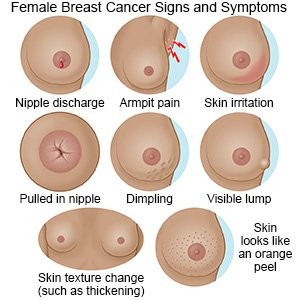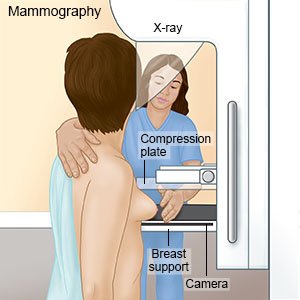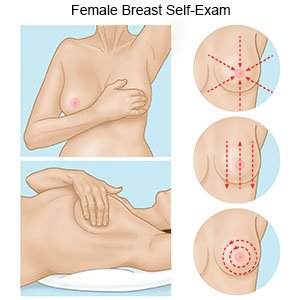Breast Cancer in Women
Medically reviewed by Drugs.com. Last updated on Aug 4, 2025.
What is breast cancer?
Breast cancer develops when cells in the breast grow out of control. Several types of breast cancer can develop, depending on which cells turn into cancer. Most breast cancers start in the tissue or ducts of the breast.
What increases my risk for breast cancer?
- Older age
- A family history of breast, prostate, or ovarian cancer
- Genes such as breast cancer 1 (BRCA1) or breast cancer 2 (BRCA2), or mutations or variants in other genes
- First monthly period before age 12, or menopause that starts after age 55
- Long-term use of estrogen or progestin, or exposure to chest or face radiation before the age of 30
- First pregnancy after the age of 30, not breastfeeding, or never giving birth
- Extra body weight, eating large amounts of high-fat food, or lack of physical activity
- Use of cigarettes or alcohol
What are the signs and symptoms of breast cancer?
- Swelling or a lump in your breast, or swollen lymph nodes under your arm or near your collarbone
- Bleeding or clear discharge from your nipple
- Breast that aches, or feels sore or heavy
- Dimpled breast skin (like an orange peel), or a sudden red area on the skin
- Nipple that looks like it has been pushed in
 |
How is breast cancer diagnosed?
Tell your healthcare provider if you have a family history of cancer, especially breast, ovarian, or prostate cancer. Tell your provider about any medical conditions you have and medicines you are currently taking. Your provider will examine your breasts for lumps, dimpled, red, or peeling skin, or problems with either nipple. You may also need any of the following tests:
- Genetic tests may find a gene mutation or variant. Genomic tests are used to get more information about any mutation or variant you have. The tests may also be used to check how your immune system responds to cancer cells. The results of all the tests can help your provider recommend medicines and other treatments for the cancer.
- An ultrasound or MRI may show cysts (fluid-filled pockets) or tumors in your breast. You may be given contrast liquid to help the tumors show up better. Tell the healthcare provider if you have ever had an allergic reaction to contrast liquid. Do not enter the MRI room with anything metal. Metal can cause serious injury. Tell the healthcare provider if you have any metal in or on your body.
- A fluid discharge test is used to check any fluid coming from your nipple to see if it contains cancer cells.
- A biopsy is a procedure used to remove part or all of the tumor. The tissue is tested for cancer, the type of cancer it is, and if it responds to hormones.
- A mammogram is an x-ray of your breasts. The pictures may show lumps that are too small to feel during a breast exam.

Related medications
How is breast cancer treated?
Treatment depends on the size of the tumor and if it has spread. Treatment also depends on your age and the type of breast cancer you have. Some types grow more slowly than others. Your healthcare provider will talk to you about the benefits and risks of treatments that might be right for you. Your provider will help you decide on treatment that best fits your needs and goals:
- Hormone medicine may be used if the cancer is sensitive to hormones.
- Radiation therapy may be used to shrink or kill cancer cells. Radiation may be directed at part or all of your breast or placed inside your body, near the cancer. Radiation therapy may be used with other treatments, such as medicines or surgery.
- Chemotherapy medicines are used to kill cancer cells. You may receive one medicine or a combination of medicines.
- Inhibitor medicines may be given to help destroy the cancer cells. One medicine helps your immune system kill the cells. Another medicine makes the cells die by preventing them from being repaired. This helps keep cancer from progressing as quickly.
- Targeted therapy is medicine that finds markers on some cancer cells and kills the cells.
- Surgery may be used to remove the tumor. Surgery called mastectomy may be used to remove all or part of your breast. A mastectomy may be done to treat breast cancer or prevent cancer from spreading.
Treatment options
The following list of medications are related to or used in the treatment of this condition.
What can I do to manage breast cancer?
- Ask questions. You will receive a lot of information about breast cancer and treatment. Questions will help you understand the information better. You may not have questions until after your appointments. Write your questions down. Call or e-mail your doctor with any questions you have.
- Ask about breast self-exams. You can check your breasts for lumps and other changes every month. Contact your oncologist if you notice any breast changes. Ask for more information about how to do breast self-exams.

- Have mammograms as directed. Ask if and how often you need a mammogram. If you are having monthly periods, schedule your mammogram for the first 2 weeks following your monthly period.

- Talk to your provider about family planning. Some types of treatment, such as chemotherapy, may affect your ability to have a baby. Your provider will talk with you about options if you want to have children.
- Do not smoke. Nicotine can damage blood vessels and make it more difficult to manage breast cancer. Smoking also increases your risk for new or returning cancer and delays healing after treatment. Do not use e-cigarettes or smokeless tobacco in place of cigarettes or to help you quit. They still contain nicotine. Ask your provider for information if you currently smoke and need help quitting.
- Limit or do not drink alcohol as directed. Alcohol increases the risk for new or returning breast cancer. If you choose to drink, limit alcohol to 1 drink per day. A drink of alcohol is 12 ounces of beer, 5 ounces of wine, or 1½ ounces of liquor.
- Maintain a healthy weight. Extra body weight increases the risk for new or returning breast cancer. Ask your healthcare provider what a healthy weight is for you. Your provider can help you create a safe weight loss plan, if needed.
- Eat a variety of healthy foods. Healthy foods include fruits, vegetables, whole-grain breads, low-fat dairy products, beans, lean meats, and fish. Ask if you need to be on a special diet.

- Drink liquids as directed. Ask how much liquid to drink each day and which liquids are best for you. Drink extra liquids to prevent dehydration. You will also need to replace fluid if you are vomiting or have diarrhea from cancer treatments.
- Be physically active, as directed. Ask your oncologist about the best physical activity plan for you. Physical activity, such as exercise, may help decrease the side effects of treatment, such as nausea, vomiting, and weakness. It may also help improve your mood. Stop exercising if you feel pain in your chest, have trouble breathing, or feel dizzy. Do not exercise if you have a fever or if you had anticancer medicines through an IV in the last 24 hours.

Call your local emergency number (911 in the US) if:
- You have chest pain when you take a deep breath or cough.
- You suddenly feel lightheaded or short of breath.
- You cough up blood.
When should I seek immediate care?
- Your arm or leg feels warm, tender, and painful. It may look swollen and red.
When should I call my doctor or oncologist?
- You have a fever.
- You have any new or different pain.
- You are vomiting and cannot keep food or liquids down.
- You are depressed or feel that you cannot cope with your illness.
- You have questions or concerns about your condition or care.
Care Agreement
You have the right to help plan your care. Learn about your health condition and how it may be treated. Discuss treatment options with your healthcare providers to decide what care you want to receive. You always have the right to refuse treatment. The above information is an educational aid only. It is not intended as medical advice for individual conditions or treatments. Talk to your doctor, nurse or pharmacist before following any medical regimen to see if it is safe and effective for you.© Copyright Merative 2025 Information is for End User's use only and may not be sold, redistributed or otherwise used for commercial purposes.
Learn more about Breast Cancer
Treatment options
Symptoms and treatments
Medicine.com guides (external)
Further information
Always consult your healthcare provider to ensure the information displayed on this page applies to your personal circumstances.
